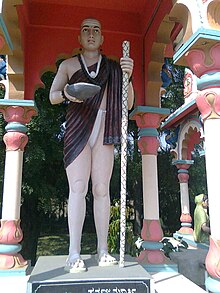Sarvajna
| Sarvajña ಸರ್ವಜ್ಞ | |
|---|---|

Sarvajña statue at Kudalasangama
|
|
| Born | Early 16th Century Abalur, Hirekerur Taluk, Haveri District |
| Died | Abalur, Hirekerur Taluk, Haveri District |
| Occupation | Poet, Pragmatist, Philosopher, Monk |
Sarvajña (Kannada: ಸರ್ವಜ್ಞ) was a Kannada poet, pragmatist and philosopher of the 16th century. The word "Sarvajna" in Sanskrit literally means "the all knowing". He is famous for his pithy three-lined poems called tripadi (written in the native three-line verse metre, "with three padas, a form of Vachana). He is also referred as Sarvagna in modern translation.
The period of Sarvajña's life has not been determined accurately, and very little is known about his personal life. Based on studies of his literary style and the references by later writers, historians estimate that he may have lived during the first half of the 16th century. Some references in his works indicate that his real name was Pushpadatta - Sarvajña appears to have been his pseudonym. From information gleaned from his poems, historians believe that his father, a Shaivaite Brahmin, met his mother, a Shudra woman named Mali in present day Haveri district (formerly part of Dharwad district) of Karnataka state on his way to Benares while on a pilgrimage. Sarvajna upheld the wisdom of pastoral life in rural areas in his poems and tried to persuade villagers to give up superstition, meaningless customs and traditions.
Sarvagna grew up as a wandering monk creating Tripadis, the famous three liners. In all, about 2000 three-liners are attributed to him. Popular because of their alliterative structure and simplicity, they deal mainly with social, ethical and religious issues. A number of riddles are also attributed to Sarvajna.
Channappa Uttangi was awarded the Kannada Sahitya Sammelana prize in 1949 for his groundbreaking work on Sarvajna.
ಮಾಸೂರ ಬಸವರಸ । ಕೂಸನೀಶನ ಕೇಳೆ।ಕಾಶಿಯ ಅಭವನೊಳು । ಪಡೆದ ವರವದುವೇ । ಸೂಸಿತೆಂತೆನಲು ಸರ್ವಜ್ಞ ॥
...
Wikipedia
